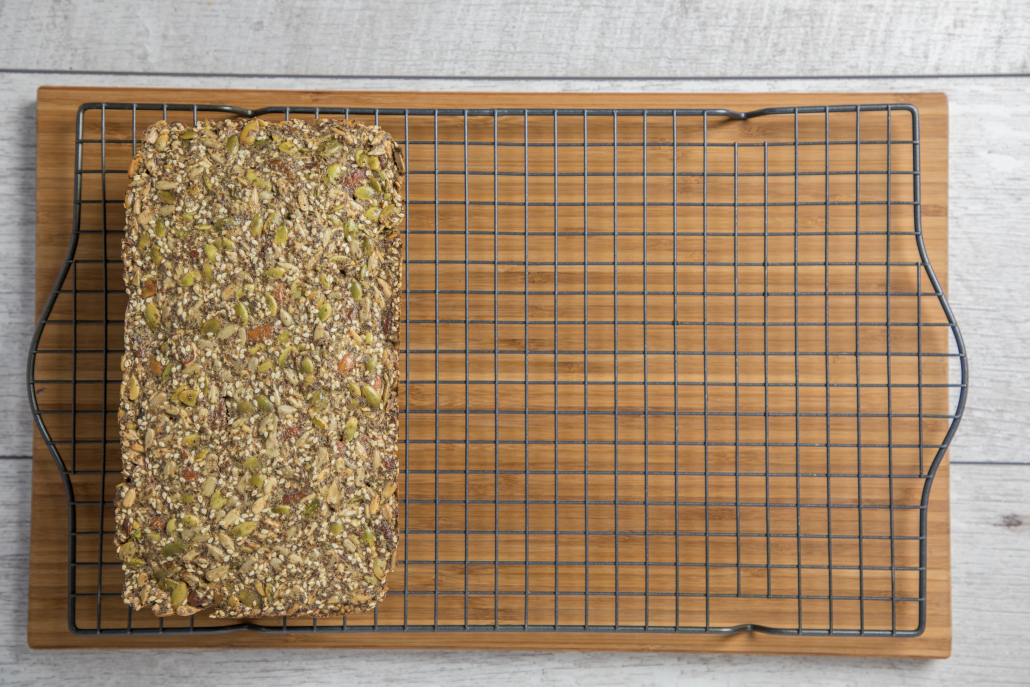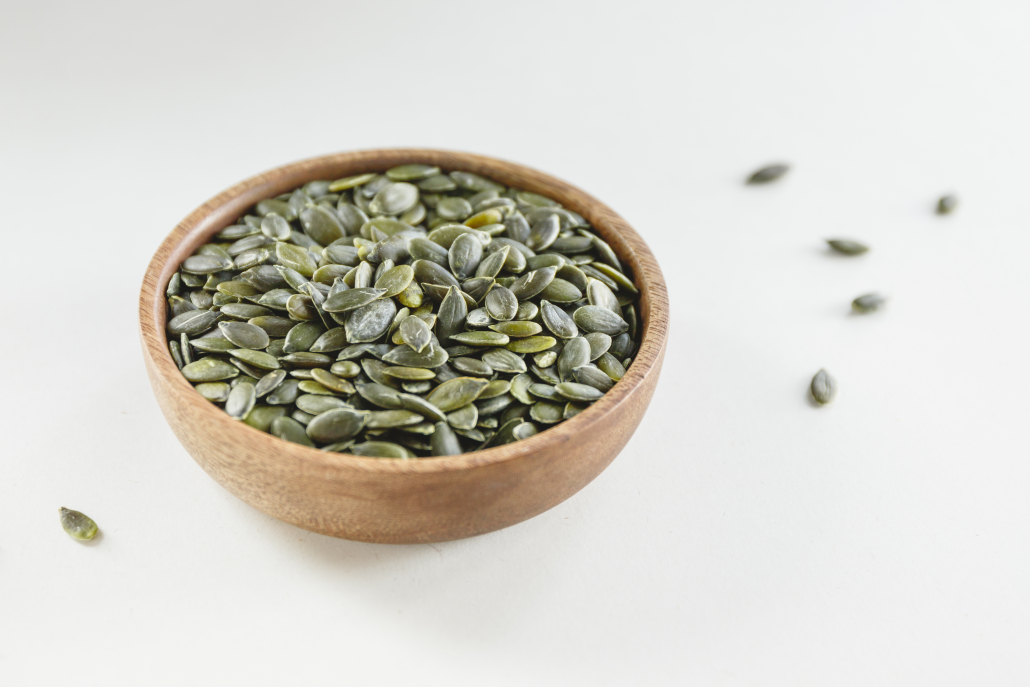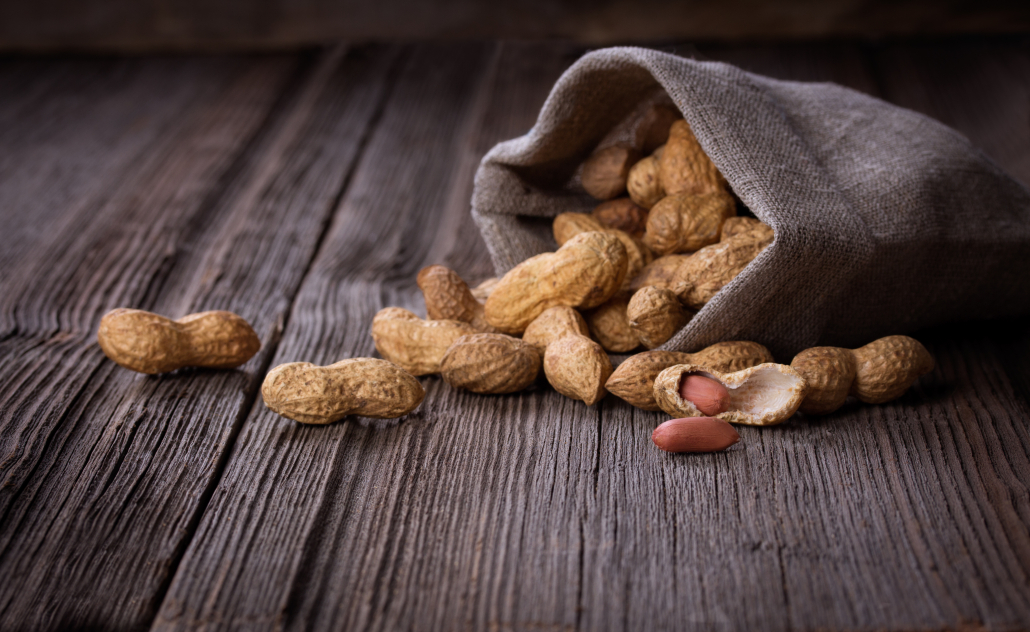We include products in articles we think are useful for our readers. If you buy products or services through links on our website, we may earn a small commission.
Are Chia Seeds Keto? Benefits, Nutrients, and Keto Chia Pudding Recipe
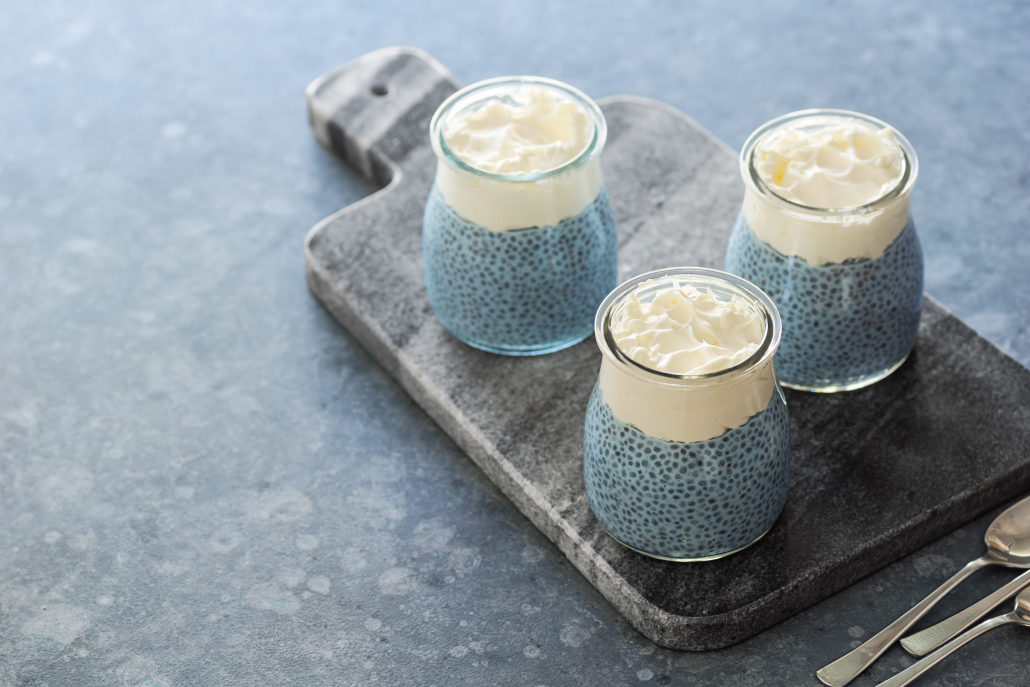
Chia seeds provide a robust nutrition profile led by an abundance of fats, complete proteins, and numerous minerals. For centuries they were an important part of Mayan and Aztec diets. In fact, “chia” is the Mayan word for strength. However, they are also a source of some plant toxins and lots of fiber that may not be suitable for people with intestinal issues. So you might be wondering, are chia seeds keto?
The short answer is, yes, but it’s a bit complicated.
In this article, we’ll explore the nutrition and benefits of chia seeds on keto, while looking at some of the possible downsides to be aware of. We’ll also share a stellar keto chia pudding recipe.
Table of Contents
Chia Seeds on Keto
Once only associated with “chia pets”–that strange 1908’s novelty, these little black seeds from the Salvia hispanica L. plant have become something of a health food craze. But do they deserve to be included in a keto diet?
When considering chia on a keto diet we first have to remember that a keto diet is high-fat, low-carb, and moderate-protein.
A ketogenic diet generally means eating in alignment with a macronutrient breakdown that looks like this:
- 70-80% of calories from fat
- 15-30% calories from protein
- 0-10% calories from carbohydrate
When we look at chia seeds nutrition we see that their macronutrient ratios are ideal for a keto diet.
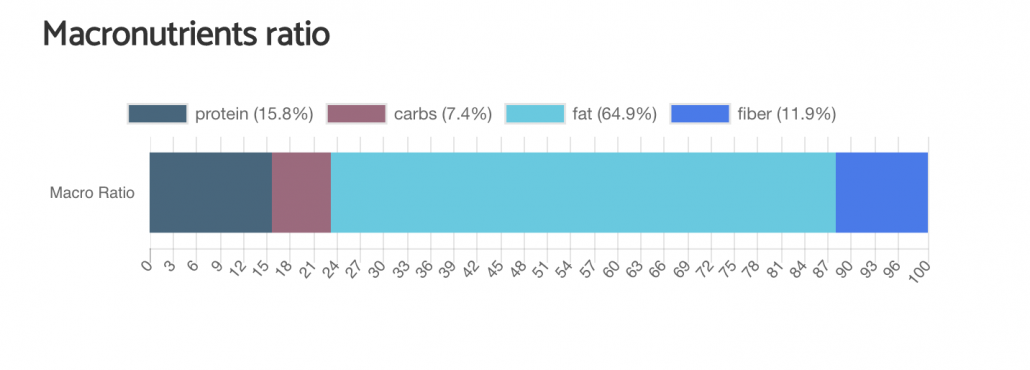
From: nutrientoptimiser.com
Carbs in Chia Seeds
For most people on keto, the carbs in chia seeds won’t be a concern if you’re eating only one or two ounces a day.
However, if you get up around 100 grams a day, chia seeds can contribute around 40% of your daily carb intake if you’re looking to keep your total carbs around 20 grams per day.
Here’s a look at the carbs in chia seeds compared to other popular seeds.
| Carbohydrates | Per 1oz. | Per 100 grams |
| Chia Seeds | 2.2g | 8g |
| Sunflower Seeds | 1.7g | 6g |
| Pumpkin Seeds | 2.6g | 9g |
Chia Seeds Nutrition
Now let’s take a deeper look at chia seeds nutrition for a standard 1 oz. serving (2.3 tablespoons) since that’s what our keto chia pudding calls for.
As you can see, just a couple of tablespoons packs an incredible amount of nutrients at only 137 calories, making chia seeds one of the most nutritious foods on the planet calorie-for-calorie.
| Nutrient | Per 1 oz. (28 grams) | %RDV |
| Calories | 137 | |
| Fat | 9g | |
| Saturated Fat | .9g | |
| Carbohydrates | 11.9g | |
| Fiber | 9.7g | |
| Net Carbs | 2.2g | |
| Protein | 4.8g | |
| Vitamin B1 (Thiamin) | .2mg | 15% |
| Vitamin B3 (Niacin) | 2.5mg | 16% |
| Zinc | 1.3mg | 9.4% |
| Iron | 2.2mg | 12% |
| Calcium | 179mg | 14% |
| Magnesium | 95mg | 23% |
| Phophorus | 244mg | 24% |
| Selenium | 16µg | 28% |
| Copper | .3mg | 29% |
| Manganese | .8mg | 34% |
Health Benefits of Chia Seeds on Keto
As a low-carb, high-fat, and nutrient-dense food, studies have found that chia seeds may offer a number of health benefits when incorporated into a keto diet.
Reduce Blood Sugar and Increase Insulin Sensitivity
If you’re eating a carb-heavy standard American Diet, you’re subjecting your body to chronically high blood sugar levels as well astronomical hikes after sugar-laden meals.
High blood sugar is linked to insulin resistance, type-2 diabetes, PCOS, certain cancers, and premature aging due to glycation. 1
Recent studies have also found that people with chronically high blood sugar have a faster rate of cognitive decline and increased rates of Alzheimer’s. 2
Encouragingly, a number of animal studies support the role of chia seeds in stabilizing blood sugar after meals, improving insulin sensitivity, and controlling blood sugar. 3 4 5
Though more human studies need to be done, at the very least we know that bread with chia seeds reduced post-meal blood sugar spikes compared to eating bread without chia seeds. 6 7
Reduced Chronic Inflammation
Inflammation plays an important role in healing injuries and fighting off infection.
However, when inflammation is chronic due to inflammatory foods and lifestyle choices it results in the diseases that kill the most people across the globe including type-2 diabetes, heart disease, and cancer. 8 9 10
Though chronic inflammation is often invisible, there are markers in the blood that doctors look for.
One study comparing the effects of chia seeds on inflammation for people with diabetes found that eating 37 grams of chia seeds a day resulted in a 40% reduction in the inflammatory marker hs-CRP. In the same study, people who ate wheat bran instead showed no significant improvement.11
Other studies haven’t found chia seeds to affect inflammatory markers one way or the other. 12
Chia seeds also contain high amounts of antioxidants with can protect against oxidative stress that leads to chronic inflammation and associated diseases. 13
Reduced Risk of Heart Disease
Though human studies are inconclusive, animal studies have found that chia seeds can lower triglycerides, inflammation, insulin resistance, and abdominal fat–all risk factories for heart disease. 13 14 15
There have been human studies that support the effectiveness of chia seeds for significantly reducing blood pressure in subjects with hypertension–a major risk factor for heart disease. 16 17
Though chia seeds on their own won’t insure against heart disease, they can be part of a broader heart-protective lifestyle that includes other keto superfoods and low-impact exercises like yoga, cycling, walking, and swimming.
Bone Strengthening Nutrients
When compared with dairy products chia provides more calcium per weight. This high calcium content along with phosphorus and a complete amino acid profile make chia seeds a great fuel for bone health. This may be especially important for people on a dairy-free vegan keto diet.
One study on rats eating a diet containing 10% of calories from chia seeds versus a conventional isocaloric diet for 10 and 13 months found an increase in bone mineral density and intestinal muscle. 17
However, chia seeds due contain some plant toxins and antinutrients including phytic acid. These compounds can impede the absorption of calcium, zinc, and other minerals. 18
Chia Seeds May Support Intermittent Fasting and Weight Loss
The chia seed nutrition combination of protein, fat, and soluble fiber in chia seeds makes them a highly satiating food. This can make them a powerful part of a diet supporting the combination of keto and intermittent fasting.
Chia seeds absorb significant amounts of water. You can see this when they soak for a while and become gelatinous. This expansion can increase feelings of fullness.
One study found that adding chia to yogurt increased satiety and reduced food consumption. 19
You can learn more about intermittent fasting click here. We also recommend women-centered IF approaches you can learn more here.
Omega-3 in Chia Seeds
Chia seeds contain an abundance of omega-3 fatty acids with 5.1g, or 316% of your RDV per 1oz serving.
However, all of these fatty acids are in the plant form called ALA. The human body is not efficient at converting ALA to beneficial forms of omega-3’s. In fact studies show that none of the ALA in chia are converted into the most important omega-3 called DHA.19
This makes the ALA omega-3s in chia seeds inferior to whole foods animal sources that you’d get from fatty keto fish and fish oil supplements.
All that said, chia seeds provide a 3:1 omega-3 to 6 ratio, which is the opposite of most other seeds and keto nuts.
This ratio is important because humans evolved on a diet of a 1:1 omega 3 to 6 ratio. Yet modern diets are around 1:16. Food higher in omega 3’s can help restore this balance.
Possible Dangers of Chia Seeds on Keto
Though chia seeds are low-carb, high-fat, and nutrient-rich, they are not without their possible dangers.
Interestingly, these dangers have to do with their high omega-3 fatty acid and high fiber content. Both are things that most people think of as healthy.
High ALA May be Associated with Prostate Cancer
Though studies provide mixed results, ALA may be associated with an increased risk of prostate cancer.
An observational study looking at 288,268 men found an association between ALA consumption and a heightened risk of advanced prostate cancer. 20
However, other large studies including one looking at 840,242 men found that high intake of ALA was associated with a decreased risk of prostate cancer. 21
For now, the jury is out, and more clinical research needs to be done. Observational (epidemiological studies) are notoriously bad at revealing cause-and-effect when it comes to food intake and disease. They rely on individual reporting and don’t control for numerous other factors.
Lectin Plant Toxins in Chia Seeds
Chia seeds contain a sticky protein called Lectin. These indigestible plant proteins can sneak into the bloodstream through the intestinal wall.
Studies show that once in the bloodstream lectins can bind with viruses and bacteria in ways that help them reach their targets. 22
Lectins can also bind to insulin receptors interfering with metabolism, increasing insulin resistance, and leading to weight gain. 23 24
Speaking to the dangers of lectins, Dr. Steven Gundry writes, “ A person might eat foods that, they thought, were healthy. However, suddenly, the body senses an attack, and reacts as if responding to an allergen, and then they might experience anything from swelling and itching, to trouble breathing, irritable mood, “brain fog,” stress, and fatigue.” 24
For these reasons, it may be best to choose lectin-free zen basil seeds over chia seeds.
Excess Fiber in Chia Seeds
There is a persistent myth that fiber is essential and uniformly good for us. However, more recent studies show that fiber may actually be a net negative. 25 26
As one of the most fiber-rich foods on earth, chia seeds should be consumed with awareness about the true costs and benefits of fiber.
For example, A 2012 study published in the World Journal of Gastroenterology concluded thatt “the previous strongly-held belief that the application of dietary fiber to help constipation is but a myth. Our study shows a very strong correlation between improving constipation and its associated symptoms after stopping dietary fiber intake.” [23]
Other studies show that excessive fiber consumption can cause constipation, diarrhea, bloating, and gas. 24
If you have ulcerative colitis, IBS, or Crohn’s disease you may want to avoid chia seeds altogether.
Keto Chia Seed Pudding
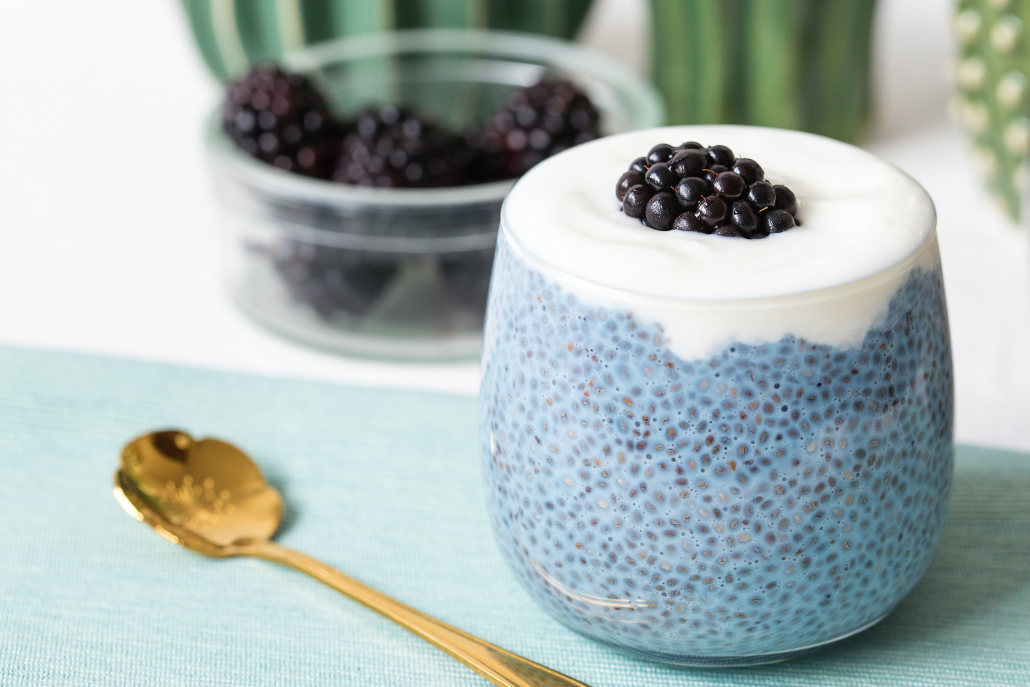
Keto chia pudding is fat-loaded, refreshing, and best of all, really easy to make.
Ingredients
- 2 cups heavy cream or coconut milk
- 2 tablespoons chia seeds (or zen basil seeds as a lectin-free alternative)
- Optional: Vanilla stevia, or no sweetening at all. Cream and coconut milk can have a naturally sweet yet sugar-free flavor.
- Optional: 1 or 2 ounces of low-carb fruits like blackberries.
- Optional: 2 scoops collagen peptides
INSTRUCTIONS
- Thoroughly mix seeds milk and optional collagen peptides, cover and refrigerate overnight.
- Add optional stevia and fruit, and add in more liquid if needed.
- Refrigerate and enjoy for up to a week in an airtight container.
Are Chia Seeds Keto? The Bottomline
Are chia seeds keto? Yes, chia seeds offer a robust nutrient profile that includes high-fat, moderate-protein, and low-carbs. From a macronutrient perspective, they fit well within a keto diet.
Chia seeds on keto may also contribute to bone health, heart health, and satiety between meals.
Though chia seeds are high in omega-3 fatty acids, this is found exclusively in the plant form called ALA, which cannot be efficiently converted into more useful forms in humans.
For this reason, if you’re looking to add beneficial omega-3’s to your diet, chose fatty keto fish, and keto seafood options.
Chia seeds also contain an antinutrient called lectin, which can be harmful if consumed in abundance. To avoid lectins you may want to substitute chia seeds with lectin-free zen basil seeds.












